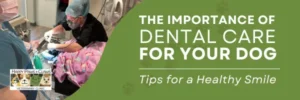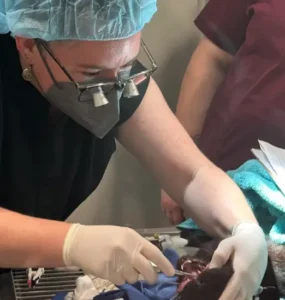Why Dental Care Is Important for Dogs

As a dog owner, you probably know that taking care of your pet goes beyond just feeding and walking. One often overlooked aspect of pet care is dental health. Just like humans, dogs need proper dental care to avoid painful and expensive issues.
Here’s why keeping your dog’s teeth healthy is so important and how you can easily incorporate dental care into their routine.
The Impact of Poor Dental Health
Poor dental health can affect more than just your dog’s mouth. It can lead to infections that spread throughout the body. Gum disease bacteria can enter the bloodstream and reach vital organs like the heart, kidneys, and liver. This highlights why dental care isn’t just about fresh breath—it’s important for protecting your pet’s overall health.
Common Dental Problems in Dogs
Many dental issues are preventable with proper care. Some of the most common problems your dogs can face include:
- Tartar Build-up: When plaque hardens on your dog’s teeth, it turns into tartar. This can lead to gum disease and other oral issues.
- Gingivitis: An early stage of gum disease, gingivitis occurs when plaque builds up along the gum line. If untreated, it can lead to more severe dental problems.
- Periodontal Disease: This is an advanced stage of gum disease. It can cause pain, tooth loss, and infection.
- Tooth Decay: Just like humans, dogs can suffer from cavities. Although this is less common, it’s still a concern.
How to Spot Dental Problems in Your Dog
Dental issues often go unnoticed in dogs because they can’t tell us when they’re in pain. However, there are a few signs you can look out for:
- Bad Breath: While some dog breath is normal, persistent foul breath can be a sign of poor oral health.
- Red or Swollen Gums: Healthy gums should be pink, not red or swollen.
- Difficulty Eating or Chewing: If your dog has trouble eating or is avoiding certain foods, it could be due to tooth pain.
- Excessive Drooling: Increased saliva production can be a sign of oral discomfort.
Tips for Maintaining Your Dog’s Dental Health
Here are some tips for maintaining your dog’s dental health:
Brushing Your Dog’s Teeth
Brushing your dog’s teeth at least two to three times a week helps prevent dental issues. Start by getting your dog comfortable with having their mouth touched, then gradually move to brushing. Be patient, as some dogs may need time to adjust.
Dental Chews and Toys
Dental chews and toys can also aid in keeping your dog’s teeth clean. They help reduce plaque and tartar while satisfying your dog’s natural urge to chew. Always supervise your dog during chew time and ensure the chews are appropriate for their size and strength.
Professional Dental Cleaning
While brushing and dental chews are great for daily care, your dog will still need professional dental cleanings. Professional cleanings are done under anesthesia and allow your vet to perform a thorough cleaning of the teeth and gums.

Dental Health for Different Breeds
Certain dog breeds are more prone to dental issues than others. Small breeds like Chihuahuas, Dachshunds, and Shih Tzus often have crowded teeth, which increases the risk of plaque build-up and gum disease. Breeds with flat faces, like pugs and bulldogs, can also face dental challenges due to their unique jaw structure. Speak with your vet about how often you should bring your pet for check-ups and cleanings.
Looking for expert dental care for your dog in Dayton, Ohio? At Happy Paws and Claws, we offer comprehensive services to keep your pet’s teeth and gums healthy. Contact us today!

